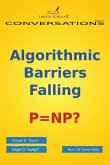The problem of privacy-preserving data analysis has a long history spanning multiple disciplines. As electronic data about individuals becomes increasingly detailed, and as technology enables ever more powerful collection and curation of these data, the need increases for a robust, meaningful, and mathematically rigorous definition of privacy, together with a computationally rich class of algorithms that satisfy this definition. Differential Privacy is such a definition. The Algorithmic Foundations of Differential Privacy starts out by motivating and discussing the meaning of differential privacy, and proceeds to explore the fundamental techniques for achieving differential privacy, and the application of these techniques in creative combinations, using the query-release problem as an ongoing example. A key point is that, by rethinking the computational goal, one can often obtain far better results than would be achieved by methodically replacing each step of a non-private computation with a differentially private implementation. Despite some powerful computational results, there are still fundamental limitations. Virtually all the algorithms discussed herein maintain differential privacy against adversaries of arbitrary computational power -- certain algorithms are computationally intensive, others are efficient. Computational complexity for the adversary and the algorithm are both discussed. The monograph then turns from fundamentals to applications other than query-release, discussing differentially private methods for mechanism design and machine learning. The vast majority of the literature on differentially private algorithms considers a single, static, database that is subject to many analyses. Differential privacy in other models, including distributed databases and computations on data streams, is discussed. The Algorithmic Foundations of Differential Privacy is meant as a thorough introduction to the problems and techniques of differential privacy, and is an invaluable reference for anyone with an interest in the topic.








